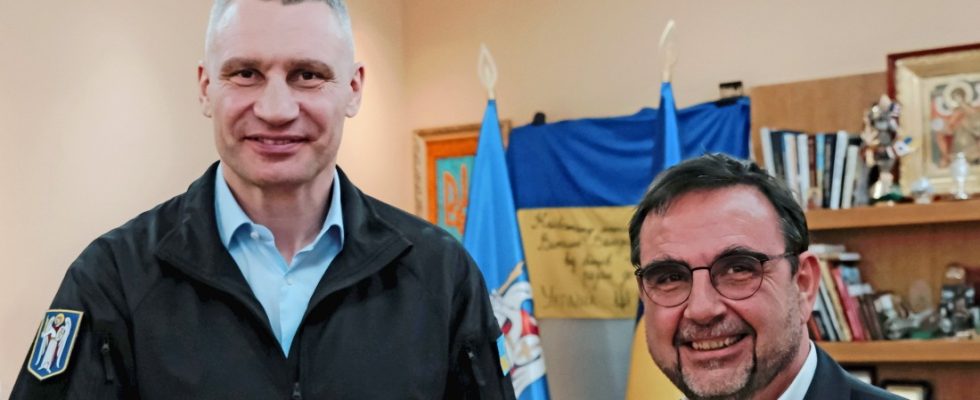Klaus Holetschek reports at lunchtime. A call from Kyiv. It’s Wednesday, day two of his four-day trip. On Tuesday morning, the head of the CSU parliamentary group flew from Munich via Vienna to Chisinau, then drove on in the large limousine, across Moldova, always north, until he arrived in the capital of Ukraine after around 15 hours. He downloaded the missile alarm app onto his cell phone and visited the bunker room in the hotel. Then he lay in bed, exhausted from the trip, but still couldn’t sleep. “It’s an unreal story,” says Holetschek; Kiev is still a city at war. “And the people here have been living with this for two years, we shouldn’t forget that.”
For two years and more than a month to be more precise. That’s how long the Russian war of aggression has been going on – and that’s how long it took for Klaus Holetschek, the first CSU state politician, to officially travel to Ukraine. A remarkably long period of time for a party whose self-image extends far beyond Bavaria. Just last week, CSU Prime Minister Markus Söder traveled to China. He hasn’t been to Ukraine yet.
Group leader Holetschek is now taking over this. He points out that Manfred Weber, CSU party vice-president and head of the European People’s Party, has already been to Ukraine. Which CSU politician ultimately travels there is “not even a question,” says Holetschek. He prefers to talk about “we” and less about “I”. It’s simply a matter of “saying to Ukraine: We stand behind you,” even after two years. It’s about “a signal that we won’t let up” with support. Holetschek would like to be seen not just as a CSU politician, but as an ambassador for the Federal Republic. There it is again, the CSU’s global political claim.
The fact that this claim is particularly visible at the moment has not only but also to do with the upcoming European elections. Everyone is swarming out now. The parliamentary group leader went to Ukraine, the Prime Minister to China, before that Söder was in Israel, Sweden and Serbia within a short period of time. And while Holetschek is visiting Kiev Mayor Vitali Klitschko on Wednesday, CSU Interior Minister Joachim Herrmann is meeting his Czech counterpart in Prague.
For the European election campaign, the CSU has firmly decided to focus on the big issues: migration, international trade, a European defense strategy. It wants to reinforce its promise to be the only party with the power to assert Bavarian interests internationally. “Playing the Bayern card” is what the CSU strategists say. In addition, the focus on the big issues is intended to make the Free Voters, in particular, look small, whose party leader Hubert Aiwanger remains the most dangerous CSU rival – but is hardly visible internationally.
In Ukraine, CSU parliamentary group leader Holetschek has a tight program: talks with the German ambassador, the German-Ukrainian Chamber of Commerce, Ukrainian MPs, the deputy parliamentary speaker – and with Kiev’s mayor Klitschko. In his luggage, the CSU parliamentary group leader also has donations from Bavaria for projects in children’s health care and the Kiev Polytechnic University. “I promised the mayor that I would examine further assistance, particularly in the area of equipment, for example in construction or in the area of rehabilitation of wounded soldiers,” said Holetschek on Wednesday afternoon after his appointment with Klitschko. A visit to the suburb of Butscha is planned for Thursday, where Holetschek would like to commemorate the mass murder of the Ukrainian civilian population on April 2, 2022.
“It’s a shame if this trip is exploited for domestic political disputes.”
Holetschek is certainly aware that the visit of a Bavarian state politician will not dominate the front pages of the Ukrainian newspapers. Some of his messages are also directed inwards. Like other CSU politicians, he accuses the federal government of acting hesitantly when it comes to arms deliveries. “The Chancellor and the Federal Government must live up to their historic responsibilities and finally take on the urgently needed ones Taurus“Supply guided missiles and more ammunition,” said Holetschek before his trip.
“It is a shame if this trip is exploited for domestic political disputes,” says SPD parliamentary group leader Florian von Brunn. Especially since he thinks that the CSU criticism in the dispute over the Taurus-Missile “is extremely shortened given the enormous quantities of important weapon systems that Germany has delivered.” Brunn believes Holetschek’s trip is fundamentally good and right “to express solidarity with Ukraine.” But he is one of those who attest that the CSU is “cozying up” with China, which emphasizes its good relationship with Russia. He therefore finds solidarity with Ukraine “contradictory”. Green Party leader Katharina Schulze is also of the opinion: “Markus Söder’s visits to Putin’s friends in Serbia and China sent the wrong signal.” A trip to Ukraine, on the other hand, is “a good sign” and the country needs Bavaria at its side.
Since the start of the war, Bavaria has counted around 160,000 refugees from Ukraine, “more than France,” as Prime Minister Söder often emphasizes. This covers “people’s need for security,” says CSU parliamentary group leader Holetschek. But Ukraine is also worried about its demographic development if people “don’t come back.” Shortly after the start of the war, Söder identified a “growing concern” in Bavaria too. Because people are unsure about what war and migration from Ukraine mean “for our security and our prosperity.”
The CSU parliamentary group is now demanding that war refugees from Ukraine no longer receive citizens’ benefits, but rather asylum seeker benefits. You shouldn’t offer “additional incentives,” says Holetschek during his call from Kiev. “People should return to their country as far as possible.”

